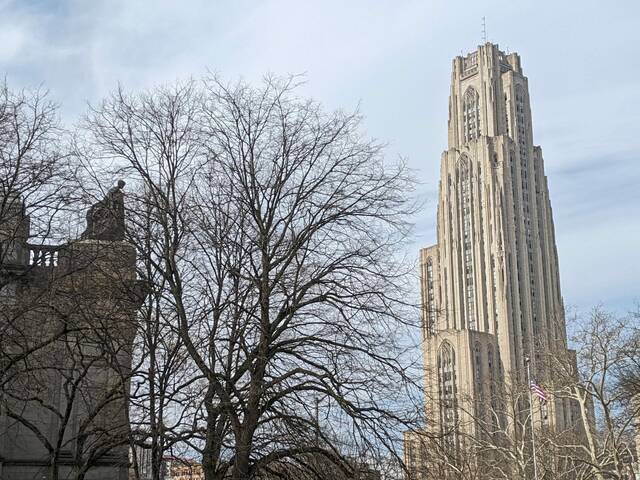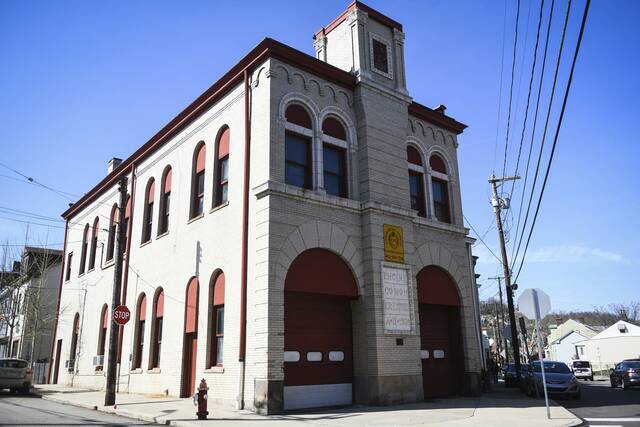A Pittsburgh City Council hearing Wednesday on the proposed Oakland Crossings development revealed that some residents remain divided on the project, despite efforts by Mayor Ed Gainey to reach a compromise between the developers and concerned residents.
Walnut Capital, the Shadyside developer that revitalized Bakery Square, has sought a zoning amendment for a 17-acre development in Pittsburgh’s Oakland neighborhood. The project would include a neighborhood grocery store, housing, large open spaces and an elevated pedestrian bridge stretching over the Boulevard of the Allies.
Many residents have voiced opposition to the development, noting among other things that neighborhood leaders are still in the process of finalizing a comprehensive plan for the area that is intended to serve as a roadmap for future development.
In an effort to reach a compromise between the developer and concerned residents, Gainey in March reached an agreement with Walnut Capital that includes “narrower and more clearly defined zoning” for the development, as well as a requirement that at least 10% of housing units are affordable for households earning up to 50% of the area median income for at least 35 years.
The plan, including Gainey’s compromise solution, was approved by the Planning Commission in late March. City Council on Wednesday held a public hearing on the measure and will ultimately have the final say on whether the development proceeds.
“This has been a very impassioned argument on many sides,” Councilman Bruce Kraus, who represents the area, said at the public hearing.
Several people who spoke at Wednesday’s hearing objected to the size of proposed buildings that are up to 400 feet long.
“What Walnut Capital can build if this rezoning is passed is immensely out of scale with existing residential areas,” said Elaina Zaitsoff, vice president of Oakcliffe Community Organization. “There’s no context for these mammoth buildings.”
Sam Spearing, housing and mobility coordinator for the Bloomfield Development Corporation, said it seemed “counterintuitive and counterproductive” to proceed with the Oakland Crossings zoning legislation as the Oakland Plan is still in the works.
“The precedent set here would only make community engagement and establishing trust more difficult,” he said, explaining that it’s already tough to garner engagement and support for community planning.
The development was first introduced by former Mayor Bill Peduto in his final months in office. It has undergone several changes, and the Planning Commission’s recommendation came with several conditions, including limiting building length to 400 feet, removing college and university uses from the zoning and requesting that City Council take several concerns into account in their final decision.
Even many of the residents who said they still oppose the development agreed that Gainey’s compromise made them somewhat more comfortable with the proposal.
“The resulting bill is better in some ways. Some of the most objectionable uses have been removed,” said Andrea Boykowycz of Central Oakland.
Still, she complained about the building sizes and said the affordability agreement didn’t go far enough.
Others who expressed for the project said they think it will benefit the neighborhood.
“Oakland is long overdue for zoning that finally reflects our unique context as a local, national and global-serving downtown center for Pittsburgh,” Georgia Petropoulos wrote in a letter of support on behalf of the Oakland Business Improvement District. “The proposal will help us all build a Pittsburgh that is inclusive, that sustains livelihoods, which provides opportunities for current and future generations.”
This kind of development would be “gladly welcomed” in many other innovation districts in competitive cities around the nation and world, said Mike Madden, director of Pittsburgh Innovation District.
“Let’s be aspirational, and let’s build something that will take Oakland into the 21st century and build Pittsburgh’s economy starting today,” he said.
Increased housing density will bring more housing supply into an in-demand neighborhood, said Sean Haran of North Oakland. Higher density, he noted, may also attract additional businesses and would allow the neighborhood to support the proposed grocery store — something many residents have said they want.
“It brings us into a new age of zoning,” Haran said, calling the affordable housing requirement a “win.”
The University of Pittsburgh also supports the development.
David DeJong, the university’s senior vice chancellor of business and operations, called it a “thoughtful proposal that, through compromise, promotes a diverse and inclusive set of users for the area.”
He said he feels Oakland Crossings ties in with the priorities highlighted in the draft of the Oakland Plan.
“We believe this proposal enables a thriving community featuring a diversity of housing options, affordable, family-serving amenities and other long-needed improvements,” he said.








